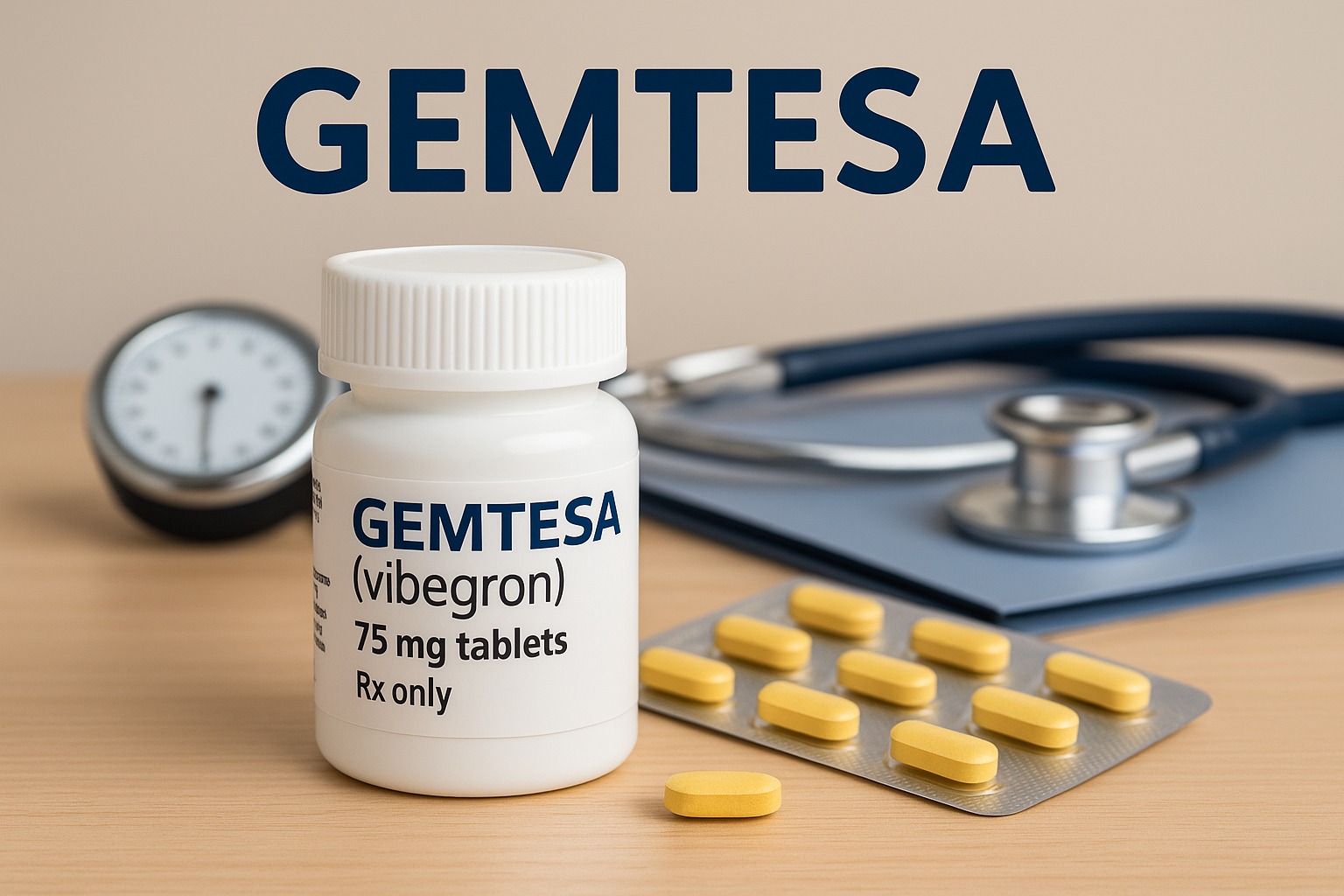Gemtesa is a prescription medication used to treat overactive bladder (OAB) with symptoms such as urgency, frequent urination, and urge incontinence. Its active ingredient, vibegron, is a β3-adrenergic receptor agonist that helps relax bladder muscles so the bladder can store more urine without sudden contractions.
Unlike some older OAB medicines, Gemtesa is not an anticholinergic, so it may cause fewer dry mouth or constipation side effects. Gemtesa comes as an oral tablet and can be taken once daily, with or without food.
In this easy-to-follow guide, you’ll learn what Gemtesa is, how it works, when doctors prescribe it, how treatment is given, possible side effects, safety tips, and answers to the most-searched questions (dosage, cost, generics, insurance, alternatives, and more).
Disclaimer: This article is for educational purposes only. It is not a substitute for professional medical advice. Always follow your doctor’s instructions.
What Is Gemtesa?
- Brand name: Gemtesa
- Generic name: Vibegron
- Drug type: β3-adrenergic receptor agonist
- Form: 75 mg oral tablet
Gemtesa is approved for adults with overactive bladder who experience urgency, frequency, or leakage. It can be taken alone or alongside other supportive therapies.
How Does Gemtesa Work?
Normally, the bladder muscle contracts too often in people with OAB, causing urgency and leaks. Gemtesa:
- Activates β3 receptors in the bladder wall.
- Relaxes bladder muscles to increase storage capacity.
- Reduces sudden or involuntary bladder contractions.
This makes it easier to hold urine longer and reduces urgency episodes.
Common Uses of Gemtesa
Doctors prescribe Gemtesa for:
1. Overactive Bladder (OAB)
- With symptoms of urgency, frequent urination, and urge incontinence.
2. OAB in Patients Unsuitable for Anticholinergics
- Helpful for those who cannot tolerate dry mouth, constipation, or memory-related side effects of older OAB medications.
Gemtesa Dosage and Administration
- Typical dose: 75 mg tablet, taken once daily, with or without food.
- Swallow whole: Do not crush or split.
- Missed dose: Skip it if close to your next dose. Do not double up.
Side Effects of Gemtesa
Common Side Effects
- Headache
- Nasopharyngitis (stuffy or runny nose, sore throat)
- Diarrhea
- Urinary tract infection (UTI)
- Elevated blood pressure (rare but possible)
Serious Side Effects (contact your doctor immediately)
- Allergic reaction (rash, swelling, trouble breathing)
- Severe or recurrent UTIs
- Worsening high blood pressure
Safety Tips With Gemtesa
- Drug interactions: Avoid combining Gemtesa with strong CYP3A4 inducers/inhibitors without medical guidance. Always share your medication list with your doctor.
- Blood pressure: Monitor regularly, especially if you have hypertension.
- Pregnancy & breastfeeding: Safety is not fully established—consult your doctor.
- Kidney/liver health: Dose adjustments may be needed in certain cases.
Gemtesa vs. Other OAB Treatments
- Compared to anticholinergics: Gemtesa may have fewer side effects like dry mouth, constipation, or confusion.
- Compared to Myrbetriq (mirabegron): Both are β3-agonists, but Gemtesa may have fewer drug interactions.
- Combination therapy: Sometimes combined with behavioral bladder training or pelvic floor exercises.
Cost and Access
- Gemtesa is prescription-only.
- Cost varies depending on insurance, pharmacy, and available coupons.
- Manufacturer assistance programs and savings cards may help reduce costs.
- As of now, no generic vibegron is available.
Frequently Asked Questions (FAQs)
Q1. How long does it take Gemtesa to work?
Some patients notice improvement within 2–4 weeks, but full benefits may take up to 12 weeks.
Q2. Can I take Gemtesa with food?
Yes, it can be taken with or without meals.
Q3. Is Gemtesa safe for older adults?
Yes, it is often prescribed in older patients because it has fewer cognitive side effects compared to anticholinergics.
Q4. What if I miss a dose?
Take it as soon as you remember unless it’s almost time for your next dose. Do not take two doses at once.
Q5. Is there a generic for Gemtesa?
Currently, Gemtesa is only available as the brand-name drug.
Final Thoughts
Gemtesa (vibegron) is a modern treatment for overactive bladder, offering effective symptom control with fewer side effects than some older medications. By relaxing the bladder muscles, it helps reduce urgency, frequency, and leakage, improving daily comfort and confidence.
To get the most benefit, take Gemtesa exactly as prescribed, maintain regular check-ups, and report any unusual side effects to your healthcare provider.


Leave a Comment